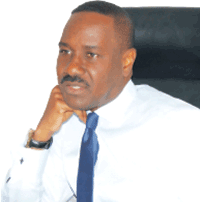Nigeria came into existence as a nation-state in 1914 through the amalgamation of the North and South protectorates.
Before then, there were various separate cultural, ethnic, and linguistic groups. These peoples lived in kingdoms and emirates with traditional but sophisticated systems of government.
The affairs of the colonial administration were conducted by the British until 1942, when a few Nigerians became involved in the administration of the country.
In the early 1950s, Nigeria achieved partial self-government with a legislature in which the majority of the members were elected into an executive council; most were Nigerians.
Nigeria became a federation of three regions in 1954 and remained so until its independence in October 1960, with the Lagos area as the Federal Capital Territory.
Three years later, on October 1, 1963, Nigeria became a republic.
The country operated the parliamentary system of government between 1960 and 1966 when the military struck in a bloody coup assassinating the Prime Minister, Abubakar Tafawa Balewa; the Federal Minister of Finance, Festus Okotie Eboh; the Premier of the Northern Region, Ahmadu Bello; and the Western Premier, S.I. Akintola.
The period between 1960 and 1966 was characterised by severe political conflicts within and between regions. The military ruled the country for the next 13 years under four regimes with two successful coups and a bloody aborted coup.
The next stage of civilian rule witnessed the introduction of the presidential system of government, which lasted only four years before another military incursion in 1983. Democracy would not be introduced into Nigeria again until 1999.
Since the return of democracy; the country has had five elections.
Between independence and now (a total 55 years) Nigeria has had 13 heads of state/presidents (14 if you count Ernest Shonekan), with two of them (Olusegun Obasanjo and Muhammadu Buhari) having double runs as military heads of state and civilian presidents.
Where we are now
Fifty-five years after independence, 14 heads of state, two systems of government and various reform programmes and a population approaching 170 million, Nigeria in 2012 still ranked 142 out of 169 nations in the Human Development Index (a comparative measure of life expectancy, literacy, education and standards of living for countries worldwide).
Other indices for 2012 indicate that the population living below $1 per day stands at 30 per cent. That number goes up to 70 per cent at population living below $2 per day.
For ease of doing business (Nigeria ranks 137/183); Economic freedom index (rank) 111/179; Corruption perceptions index (rank) 134/178; Press freedom index (rank) 145/178.
Infant mortality rate stands at 86 deaths per 1,000 live births. Life expectancy at birth is 48 years on the average.
All these despite being blessed with natural gas, petroleum, tin, iron ore, coal, limestone, niobium, lead, zinc, arable land and human resources.
Apart from the economic failures are the social and political failures also.
In 2010, President Goodluck Jonathan celebrated Nigeria’s 50th birthday by stating that it is nothing short of a miracle that the country still exists. And he is very right.
He went on to marvel over the fact that a country as large and diverse as Nigeria, a country destined to fall apart, defied all odds and remained one nation.
But despite this success, it is also a nation that is still very much divided.
One of the main reasons for Nigeria’s stagnated development are the persisting conflicts between ethnic groups, between rebels and the government and between north and south.
One of the oldest conflicts is that between the Islamic north and the Christian south. Although great cultural and ideological differences exist within both regions, they are outweighed by the differences between the regions.
On an ideological level, the south fears the Islamic north and the desire of some northern states to install Sharia law.
But the conflict has an economic dimension as well.
The south controls most of Nigeria’s oil fields and as such its population is richer, better educated and generally more developed. In contrast, most of the population in the northern states relies on agriculture as its main source of income.
In the southern states and especially in the Niger Delta, armed rebels routinely attack the oil industry and its infrastructure. In addition, kidnappings and rapes are commonplace.
Rebel groups demand a share in the oil receipts and blame both oil companies and the government for their failure to create social development.
The fact that even in the southern states oil revenues fail to trickle down to other parts of the economy bolsters their argument. As does the high poverty rate and the extreme corruption that holds the country in its grip.
More recently is the spate of terrorism in the north by a group called Boko Haram (which literally means ‘Western education is a sin’.)
Facts emerging now indicate that the threats posed by the group could have been curtailed if not for the extra-judicial killing of its leader, Mohammed Yusuf, along with dozens of his followers.
Also is the fact that the sect is being used for political purposes and financed by those in positions of authority.
However, the hydraheaded monster has now become uncontrollable and hijacked by Islamic fundamentalists.
• Continues in next edition.




